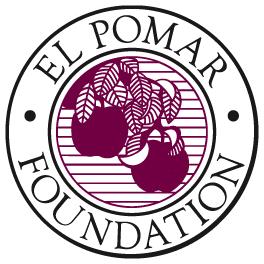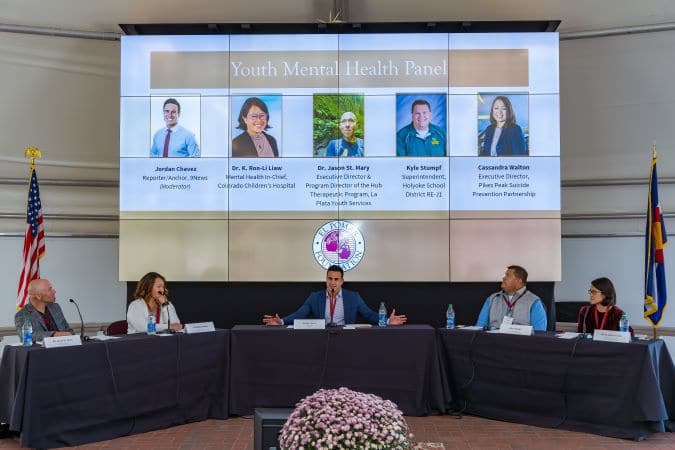Each year, El Pomar Foundation’s Regional Partnerships program convenes its regional council members and other philanthropic leaders at its Statewide meeting to network, learn about and discuss key issues affecting the state.
A focus on well-being
Over the past few years, the Foundation has reflected on its mission and what it means to focus on the well-being of people across Colorado. At our Statewide meeting’s general session, we invited our council members and guests to join us in that conversation by considering the meaning of well-being from a few different perspectives. The afternoon began with a keynote from Harry Nathan Gottlieb, the founder of Unify America—who spoke to how we find our commonalities and humanity across differences. These remarks encouraged the audience to reflect on what we can do, as individuals, to enhance the well-being of our community through our interaction and engagement with those around us and through the promotion of values such as belonging, learning and purpose.
We then transitioned to a panel discussion of youth mental health and how to consider the well-being of our youngest Coloradans around the state. We believed this was a particularly relevant conversation this year given that seven of our eleven councils currently focus their funding on youth mental health. While some councils have focused funding in this area for many years, others have moved toward this issue area more recently as we continue to navigate the effects of the pandemic. Through this panel, we hoped to highlight not just the challenges in this issue area, but also to identify where additional grant dollars and support could have impact and potentially inform the Foundation’s future grant making.
Jordan Chavez, 9News Reporter and Anchor, facilitated the discussion among Dr. K. Ron-Li Liaw, Mental Health In-Chief at Colorado Children’s Hospital; Dr. Jason St. Mary, Executive Director of La Plata Youth Services in Durango; Kyle Stumpf, Superintendent at Holyoke School District RE-JI; and Cassandra Walton, Executive Director of Pikes Peak Suicide Prevention Partnership. During the session, panelists discussed their impressions of the most pressing issues on the topic as well as effective strategies to address youth mental health and well-being. Key topics of the discussion included barriers to access, the value of strategic partnerships, engaging the youth voice, and the importance of trusted adult relationships.
Youth Mental Health Panel Highlights and Takeaways
On the topic of access to mental health services, panelists mentioned numerous barriers to access across Colorado, including long waitlists, high costs, lack of transportation and staffing issues. Dr. K. Ron-Li Liaw explained 80 percent of mental health services in Colorado are private practices, which often do not accept insurance or Medicaid, making them inaccessible to many families. Superintendent Kyle Stumpf noted how schools are working to provide more accessible options to students but often face issues finding professionals to fill positions. For example, Holyoke School District RE-JI obtained funding for a counselor, but the position remains unfilled after many months of being posted. Panelists suggested that additional funding for incentives to attract and retain mental health professionals could help address these issues.
Panelists also emphasized the importance of building strategic partnerships to address gaps in services, especially in rural areas. As one example, Dr. Jason St. Mary described the instrumental role of partnerships between youth-serving organizations, school districts, hospitals and government agencies in the operation of “The Hub Therapeutic Program,” which provides free mental health services to youth in Durango. Other panelists echoed the sentiment that an important way to tackle this multi-faceted and challenging issue is through investing in strategic partnership opportunities.
The importance of listening to youth voices to best identify and address youth needs was another key theme of discussion. Panelists from both urban and rural areas described how their respective organizations incorporate youth voices in their work through surveys and dedicated board positions. From what the panelists frequently hear, youth often identify the importance of cultivating genuine connection as a way to improve youth mental health. Cassandra Walton highlighted how Pikes Peak Suicide Prevention Partnership has responded to youth input, including creating space for a weekly support group for students.
In addition to creating connection between and among youth, panelists agreed establishing a network of trusted adults was essential to supporting youth well-being. For example, Kyle Stumpf noted the importance of all adult influences, not just teachers. He emphasized that along with training teachers, it is important to provide resources to the other adults who touch our children’s lives, including coaches, bus drivers and other school staff. Panelists also urged audience members to serve as trusted adults for the children in their own lives.
Youth mental health and well-being is a focus area of not only many of El Pomar’s regional councils, but also across our nation. Given the complexity of the issue and its relevance to many in our audience, we valued the opportunity to hear from leaders across the state who are actively working to address the issue. The highlights above were only a few of the many important remarks our panelists made in the 40-minute session.
* * *
The Regional Partnerships program allows the Foundation’s grant making across the state to be more proactive and responsive to the needs and issues observed by our council members. Through our Statewide meeting each year, we hope to offer conversation and opportunities for dialogue relevant to our council members and to help identify ways they can assist in identifying where grant funds could be particularly impactful in their regions.
We hope that through Regional Partnerships and other programmatic work at El Pomar Foundation we can continue these critical conversations in pursuit of our mission to enhance, encourage and promote the current and future well-being of the people of Colorado.



